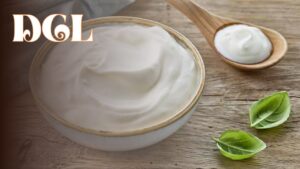Have you ever wondered if sour cream is safe for dogs to eat? Well, I’ve got some answers for you.
In this article, we’ll dive into the nutritional content of sour cream and explore any potential risks or side effects it may have on our furry friends.
We’ll also discuss the importance of moderation and portion control when it comes to sharing this creamy treat with our dogs.
And don’t worry, if sour cream isn’t the best choice for your pup, I’ll provide some healthy alternatives that they’ll surely love.
So, let’s get started and find out whether sour cream is okay for dogs or if we should stick to other options.
Understanding the Nutritional Content of Sour Cream
You might be surprised to learn that sour cream, while delicious to us humans, should be consumed in moderation by your furry friend due to its high fat content. Dogs have different nutritional needs than humans, and their bodies are not designed to process certain foods in the same way.
Sour cream is known for its rich and creamy texture, but it also contains a significant amount of fat. Excessive fat intake can lead to weight gain, obesity, and other health issues in dogs.
It is important to understand the nutritional content of sour cream before giving it to your dog. A typical serving of sour cream contains about 11 grams of fat, which is quite high for a small dog. Additionally, sour cream is also high in calories, with around 51 calories per tablespoon. These calories can add up quickly, especially if your dog has a tendency to overeat or if you frequently use sour cream as a topping or ingredient in their meals.
While a small amount of sour cream every now and then may not cause any harm, it is best to avoid making it a regular part of your dog’s diet. Instead, focus on providing them with a balanced and nutritious diet that meets their specific needs. If you are looking to add some flavor to your dog’s meals, there are plenty of other dog-friendly options available, such as plain yogurt or cottage cheese, which can be a healthier alternative to sour cream.

Potential Risks and Side Effects
While it may be tempting to share certain dairy products with your furry companion, it is important to be aware of the potential risks and side effects that can arise.
When it comes to sour cream, there are a few things to consider. One of the main concerns is lactose intolerance. Many dogs are lactose intolerant, meaning they lack the necessary enzyme to break down lactose, the sugar found in milk products. This can lead to digestive upset, including diarrhea, gas, and bloating.
Additionally, sour cream is high in fat and calories, which can contribute to obesity and weight gain in dogs. Excessive consumption of sour cream can also lead to pancreatitis, a painful inflammation of the pancreas.
Another potential risk is the presence of additives and seasonings in sour cream, such as onions and garlic, which can be toxic to dogs.
It is always best to consult with your veterinarian before introducing any new food into your dog’s diet. They can provide guidance on what is safe and appropriate for your furry friend.
Moderation and Portion Control
When it comes to feeding sour cream to dogs, it’s important to understand the concept of moderation and portion control.
Occasional treats of sour cream can be given as a special indulgence, but regular consumption should be avoided.
If you want to include sour cream in your dog’s diet, it’s crucial to adjust their overall food intake accordingly.
Consult with a veterinarian to ensure it’s safe for them.
Occasional Treats vs. Regular Consumption
Although it may be tempting to share a dollop of sour cream with your furry friend, moderation is key when it comes to indulging them in occasional treats. While sour cream can be safe for dogs in small amounts, regular consumption can lead to health issues. Just like humans, dogs need a balanced diet to stay healthy, and too much sour cream can disrupt that balance. It is important to remember that sour cream is high in fat and calories, which can contribute to weight gain and obesity in dogs. Additionally, some dogs may have difficulty digesting dairy products, leading to digestive upset. To help you visualize the impact of sour cream on your dog, here is a table comparing the nutritional content of 1 tablespoon of sour cream to the recommended daily intake for a 25-pound dog:
| Nutrient | Sour Cream (1 tbsp) | Recommended Daily Intake (25 lb dog) |
|---|---|---|
| Fat | 5 grams | 10-15 grams |
| Calories | 52 calories | 400-600 calories |
| Protein | 0.5 grams | 25-30 grams |
| Carbohydrates | 0.5 grams | 50-75 grams |
By considering these factors and practicing moderation, you can ensure that your dog stays healthy and happy.
Adjusting the Dog’s Diet to Accommodate Sour Cream
To incorporate sour cream into your pup’s diet, you can make small adjustments to their meals.
It’s important to remember that sour cream should only be given to dogs in moderation. Too much can lead to digestive issues like upset stomach or diarrhea.
As a responsible dog owner, I like to mix a small dollop of sour cream into my dog’s regular food as an occasional treat. I find that this adds a little extra flavor and makes mealtime more exciting for them.
However, I always make sure to monitor their reaction and watch for any signs of discomfort.
If your dog has any pre-existing health conditions or is on a special diet, it’s best to consult with your veterinarian before adding sour cream to their meals.
Consulting with a Veterinarian
Consulting with a vet is essential before incorporating sour cream into your pup’s diet. It’s important to remember that every dog is unique, and what may be safe for one dog may not be safe for another. Here are four reasons why you should consult with a veterinarian before giving sour cream to your furry friend:
- Health conditions: Dogs with certain health conditions, such as pancreatitis or lactose intolerance, may not tolerate sour cream well. A vet can assess your dog’s health and determine if sour cream is suitable for them.
- Nutritional balance: Sour cream is high in fat and may lead to weight gain if given in excess. A vet can advise on portion sizes and ensure your dog’s overall diet remains balanced.
- Allergies: Just like humans, dogs can have food allergies. A vet can help identify any potential allergies or sensitivities your dog may have to sour cream.
- Potential hazards: Some ingredients commonly found in sour cream, like onions or garlic, can be toxic to dogs. A vet can guide you on safe alternatives or ways to prepare sour cream for your pup.
Remember, your veterinarian is the best source of information when it comes to your dog’s diet. So, schedule a consultation to ensure your pup can enjoy sour cream safely.
Healthy Alternatives to Sour Cream
When it comes to finding healthy alternatives to sour cream for my dog, I have discovered three great options: natural yogurt, cottage cheese, and pumpkin puree.
Natural yogurt is a great source of probiotics and calcium, while cottage cheese provides protein and is low in lactose.
Pumpkin puree is not only delicious, but it also adds fiber and vitamins to my dog’s diet.
Natural Yogurt
If your pup is looking for a tasty treat, natural yogurt can be a great option! Not only is it delicious, but it also provides some health benefits for your furry friend.
Natural yogurt is a good source of protein and calcium, which are essential for your dog’s overall health and wellbeing. It can also help improve digestion and promote a healthy gut due to its probiotic properties.
Here are some key reasons why natural yogurt is a great choice for your dog:
- It is a natural and healthy alternative to sour cream.
- It is low in lactose, making it easier for dogs to digest.
- It can help alleviate gastrointestinal issues and diarrhea.
- It can serve as a cool and refreshing treat during hot summer months.
Remember to choose plain, unsweetened yogurt without any added flavors or sweeteners. Introduce it gradually into your dog’s diet and monitor for any adverse reactions. Your pup will surely enjoy this creamy and nutritious treat!
Cottage Cheese
Now let’s talk about cottage cheese, which is another great option for dogs.
I personally love giving my furry friend a spoonful of cottage cheese as a special treat. Not only does it provide a tasty and creamy texture that dogs seem to enjoy, but it also offers several health benefits.
Cottage cheese is a good source of protein, which is essential for muscle development and overall growth. It also contains calcium, which promotes strong bones and teeth.
Additionally, cottage cheese is low in lactose, making it easier for dogs to digest compared to other dairy products.
However, it’s important to remember that moderation is key. Too much cottage cheese can lead to an upset stomach or weight gain. So, I always ensure that I give my dog cottage cheese in small portions as an occasional treat.
Pumpkin Puree
Let’s dive into the benefits of including pumpkin puree in your dog’s diet! Pumpkin puree is not only a delicious treat for your furry friend, but it also offers several health benefits.
First, pumpkin puree is rich in fiber, which can help regulate your dog’s digestion and prevent constipation.
Second, it is a great source of vitamins and minerals, such as vitamin A, vitamin C, and potassium, which can support your dog’s immune system and overall health.
Lastly, pumpkin puree can help with weight management as it is low in calories and can make your dog feel fuller for longer.
Incorporating pumpkin puree into your dog’s meals is easy. You can mix it with their regular food or use it as a tasty topping. Just make sure to use plain pumpkin puree without any added sugars or spices.
So go ahead and give your dog this nutritious and tasty treat!

Conclusion and Summary
Overall, sour cream may not be the best option for dogs due to its high fat and lactose content, but occasional small amounts as a treat should not cause harm. It’s important to remember that dogs have different dietary needs than humans, and while sour cream may be a tasty addition to our meals, it may not be the healthiest choice for our furry friends.
Sour cream is high in fat, which can lead to weight gain and other health issues in dogs. Additionally, it contains lactose, a sugar found in milk products that many dogs have difficulty digesting. This can result in gastrointestinal upset, including diarrhea and stomach discomfort.
If you do decide to give your dog sour cream as an occasional treat, it’s important to do so in moderation. Only offer small amounts and ensure that it is not a regular part of their diet. It’s also a good idea to check with your veterinarian beforehand, especially if your dog has any underlying health conditions.
In conclusion, while sour cream may not be the best choice for dogs, occasional small amounts as a treat should not cause harm. However, it’s important to prioritize their overall health and well-being by providing a balanced and appropriate diet specifically designed for dogs.
Frequently Asked Questions
Can dogs have flavored sour cream like onion or ranch?
No, dogs should not have flavored sour cream like onion or ranch. Onion is toxic to dogs and can cause serious health issues. It’s best to stick with plain, unsweetened sour cream in small amounts as an occasional treat.
What are the specific nutritional benefits of sour cream for dogs?
The specific nutritional benefits of sour cream for dogs include calcium, protein, and healthy fats. However, it should be given in moderation as too much can lead to weight gain and digestive issues.
Can sour cream cause digestive issues in dogs?
Sour cream can cause digestive issues in dogs. It may lead to upset stomach, diarrhea, or vomiting. It’s best to avoid feeding sour cream to dogs to prevent any potential digestive problems.
Are there any potential allergic reactions that dogs may have to sour cream?
Dogs may have potential allergic reactions to sour cream. It’s important to watch for symptoms like itching, hives, or digestive issues. If your dog shows any signs of an allergic reaction, consult a veterinarian.
Can sour cream be given to dogs as a treat or snack?
Sour cream can be given to dogs as an occasional treat or snack. However, it should be given in small amounts and only if the dog doesn’t have any allergies or digestive issues.
Conclusion
In conclusion, sour cream can be given to dogs in moderation, but it is not recommended as a regular part of their diet. While it does contain some nutrients, it is also high in fat and can lead to weight gain and digestive issues.
It is important to prioritize a balanced and healthy diet for our furry friends. If you do choose to give your dog sour cream, be sure to do so in small portions and monitor their reaction.


